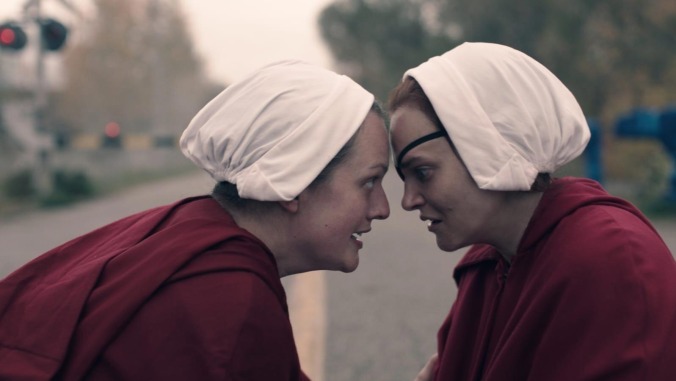The Hulu original series lost all of its 21 nominations for its fourth season, setting a new record for the most Emmy losses in a year. The previous show to hold the record was Mad Men, losing 17 nominations in 2012 for its fifth season. But it’s not like The Handmaid’s Tale hasn’t had any victories. The show won eight Emmys during its first season, at the height of its popularity.
Though many of the TV Academy’s selected winners throughout the night were head-scratchers, we have to admit that it would’ve been tough for Handmaid’s Tale to win in many of the categories it was nominated for. The acting categories were stacked with major names—particularly within The Crown’s cast—so it would’ve been tough to beat critic favorites like Olivia Colman and Gillian Anderson. And with The Crown also in the Outstanding Drama Series category, things looked pretty bleak for Handmaid’s.
The show’s quality also dipped severely after premiering in 2017. As The A.V. Club’s Danette Chavez wrote, “The Handmaid’s Tale debuted to critical acclaim in 2017, winning eight Emmy Awards, including Outstanding Drama Series. Bruce Miller’s adaptation of Margaret Atwood’s dystopian novel was similarly met with praise from critics (including this writer) at the start of its second season, but subsequent premieres have elicited more ambivalence than anticipation. Season two started off strong before getting bogged down by misery and repetition, as the series became increasingly desperate to keep June (Elisabeth Moss), then known as Offred, in Gilead’s Christofascist clutches. The third season, which premiered in 2019, maintained the torture porn, white feminism, and strained logic of its predecessor, and saw the show give into its worst impulses while trying to be the timeliest of TV dramas.”
Chavez noted that the show’s fourth season didn’t make up for those missteps, instead, “it actually perpetuates some,” but also adds that the show did confront them, at least. However, it was not enough for it to regain the momentum from when it premiered, and what was once a “water cooler show” became a “wait, that’s still on?” series.












![HBO teases new Euphoria, Larry David, and much more in 2026 sizzle reel [Updated]](https://img.pastemagazine.com/wp-content/avuploads/2025/12/12100344/MixCollage-12-Dec-2025-09-56-AM-9137.jpg)




























